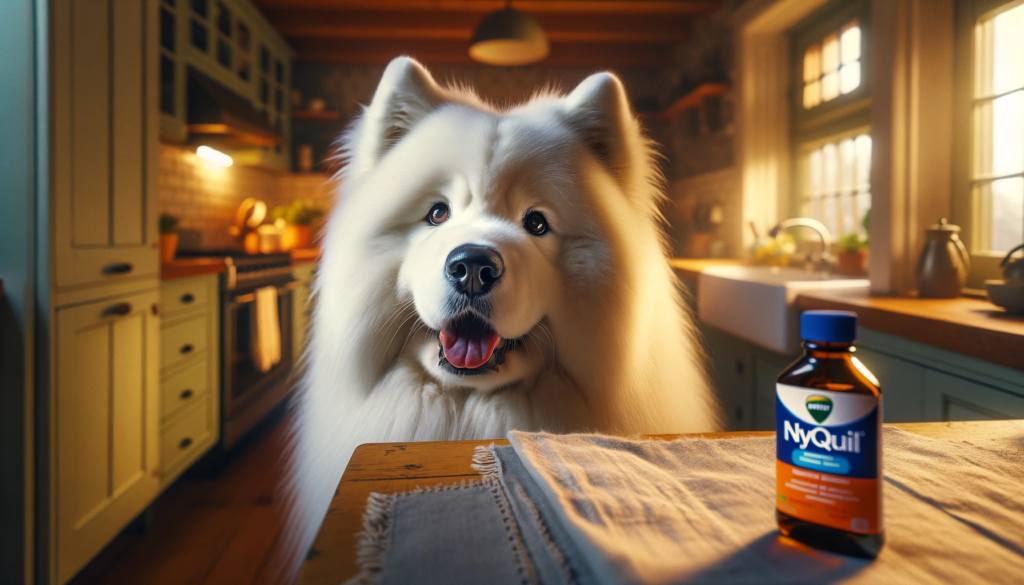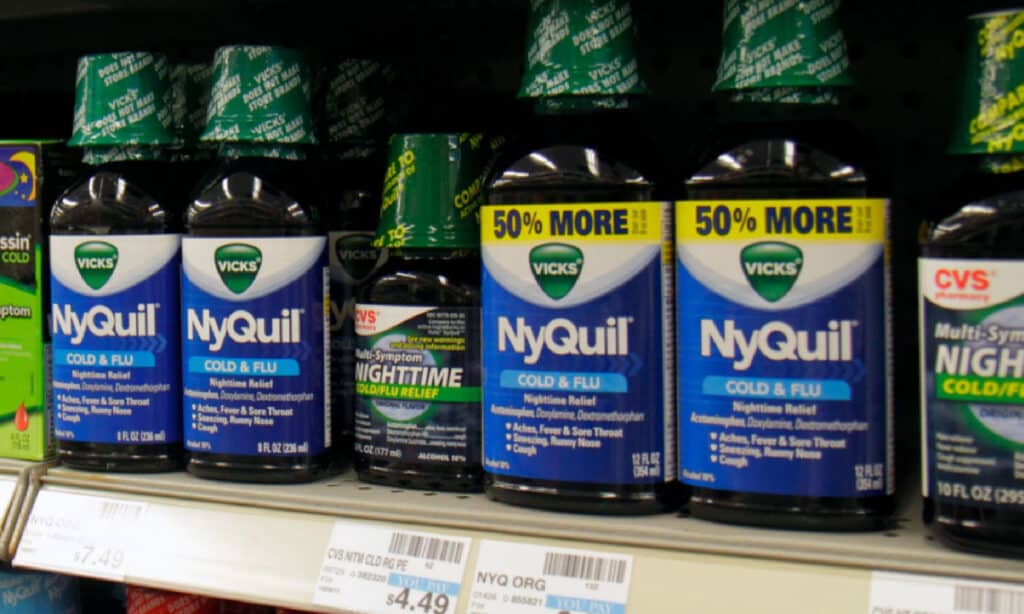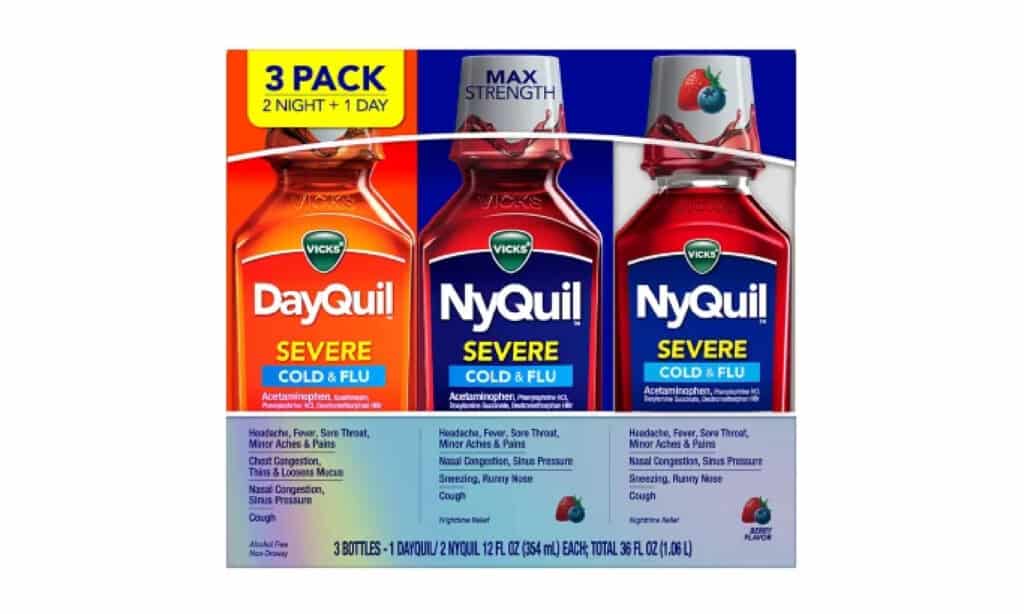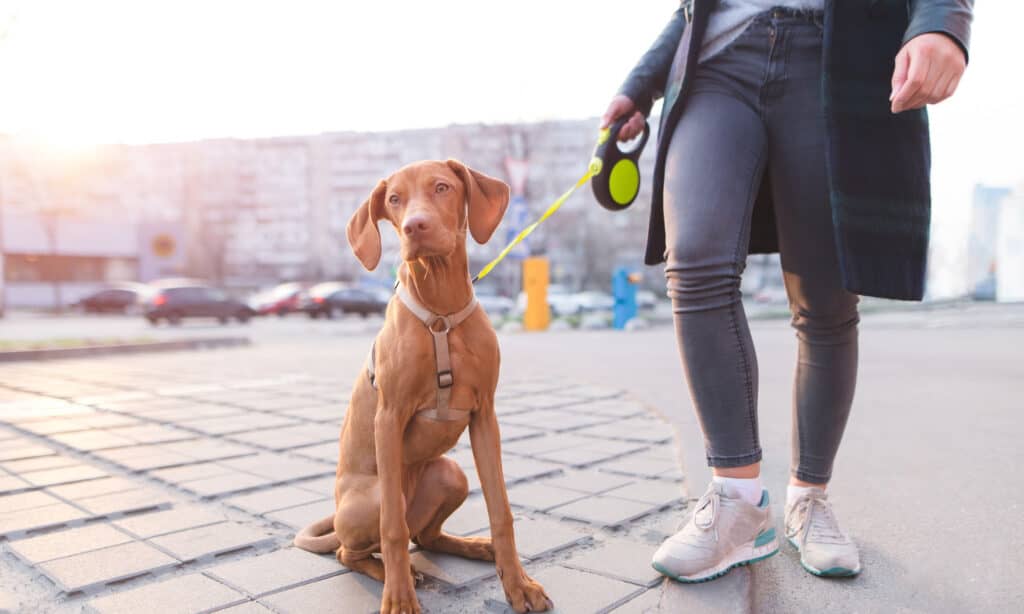As pet parents, we always strive to take good care of our furry buddies and ensure their well-being. However, there are times when our dogs may suffer from health issues that require medication to ease their symptoms. If you’re a pet parent, you might have a bottle of Nyquil lying around at home. But, can you give a dog Nyquil? It’s a valid question, and unfortunately, the answer isn’t a straightforward yes or no.
In this blog, we’ll dive deep into the effects of Nyquil on dogs, the potential risks involved in administering it to them, and explore alternative treatment options. We’ll also share real-life stories of pet parents who have given Nyquil to their dogs, along with insights from veterinary experts.
So, if you’re a concerned pet parent who wants to know if Nyquil is safe for your dog, keep reading. Our blog will equip you with the knowledge you need to make an informed decision about your pup’s health.

What Is Nyquil?
Nyquil is a popular over-the-counter medication that’s widely used to treat symptoms of cold and flu in humans. It comes in different forms such as liquids, capsules, and tablets, and contains a blend of active ingredients like acetaminophen, dextromethorphan, and doxylamine succinate. These ingredients work together to ease various symptoms like cough, fever, congestion, and sneezing.
Note that Nyquil is formulated for human use only, and it is not safe for dogs. Giving Nyquil to your furry friend without consulting a veterinarian can pose risks since the dosage and ingredients are not tailored to meet your pet’s unique needs. Additionally, some of the components in Nyquil can be harmful to dogs if not administered in the right amounts.
Can You Give a Dog Nyquil?
One of the most common questions among pet owners is whether it’s safe to give their dog Nyquil. You might be tempted to give your furry friend Nyquil when they exhibit symptoms of a cold or flu. However, it’s crucial to understand that Nyquil is formulated for humans and is not approved for use in dogs.
While Nyquil contains ingredients that can be effective in treating human cold and flu symptoms, the dosage and composition may be harmful to dogs. Some of the active ingredients in Nyquil, such as acetaminophen, can cause liver damage and even death in dogs if given in excess. Moreover, doxylamine succinate and dextromethorphan, which are also present in Nyquil, can cause severe side effects in dogs if not administered correctly.
If your dog is suffering from symptoms such as coughing, sneezing, or congestion, it’s essential to consult a veterinarian before giving them Nyquil. A safe and effective treatment plan specifically designed for your dog’s needs can be recommended by your vet. The veterinarian may prescribe safe medications that treat your dog’s specific symptoms.

What are the Harmful Ingredients in Nyquil?
Nyquil contains several active ingredients that can be harmful to dogs if not given in the correct dosage. One of the main ingredients in Nyquil is acetaminophen, which is a pain reliever and fever reducer. While acetaminophen is safe for humans in the recommended doses, it can be toxic to dogs and cause liver damage, vomiting, diarrhea, and even death if given in high amounts.
Another ingredient in Nyquil is dextromethorphan, which is a cough suppressant. In dogs, dextromethorphan can cause lethargy, vomiting, loss of coordination, and even seizures if given in high doses.
Additionally, Nyquil contains doxylamine succinate, an antihistamine that can cause drowsiness and dry mouth in humans. In dogs, doxylamine succinate can cause gastrointestinal upset, lethargy, and even seizures if given in excessive amounts.
Your vet can recommend a safe and effective treatment plan specifically designed for your dog’s needs. If your dog is exhibiting symptoms of a cold or flu, it’s crucial to consult a veterinarian before giving them any medication, including Nyquil. Your vet can tailor a safe and effective treatment plan that meets your dog’s needs and does not harm their health.
What Signs To Watch For If Your Dog Accidentally Ingests Nyquil?
If your dog accidentally ingests Nyquil, there are several signs you should watch for that may indicate a potential issue. The severity of the symptoms can vary depending on the amount of Nyquil your dog has consumed and their overall health condition. Here are some of the signs to watch for if your dog ingests Nyquil:
- Vomiting and diarrhea – These are common symptoms that may indicate that your dog’s digestive system is reacting to the medication.
- Lethargy – Lethargy in dogs could indicate Nyquil is impacting their nervous system.
- Loss of coordination – Nyquil may harm your dog’s coordination, particularly while exercising, which can be hazardous to their health.
- Disorientation – If your dog seems confused or disoriented, it may be a sign that they have ingested too much Nyquil.
- Tremors and seizures – In severe cases, Nyquil ingestion can cause tremors or seizures, which require immediate medical attention.
If you notice any of these symptoms in your dog after they have ingested Nyquil, it’s important to contact your veterinarian immediately. The vet can evaluate the issue and suggest proper treatment to minimize harm to your dog. In general, it’s best to keep Nyquil and other medications out of reach of your dog to avoid accidental ingestion.

When or If You Should Go To The Vet?
If your dog has ingested Nyquil, it’s important to monitor them closely for any symptoms of an adverse reaction. If your dog is exhibiting any of the signs mentioned earlier, you should contact your veterinarian immediately.
In general, it’s best to err on the side of caution and seek veterinary care if you suspect that your dog has ingested Nyquil. The veterinarian can assess your dog’s condition, perform diagnostic tests if necessary, and recommend the appropriate treatment.
If your dog has ingested Nyquil recently, the veterinarian may recommend inducing vomiting to prevent further absorption of the medication. In some cases, they may also administer activated charcoal to help absorb any remaining medication in your dog’s stomach.
Your dog may require hospitalization for supportive care, including intravenous fluids and medication to manage their symptoms in severe cases. Your vet will closely monitor your dog’s condition and provide the necessary care to ensure their recovery.
Are There Any Dog Safe Alternatives to Nyquil?
If you’re looking for a safe alternative to Nyquil to treat your dog’s symptoms, there are several options available that are formulated specifically for pets. Here are a few dog-safe alternatives to Nyquil:
- Benadryl – This over-the-counter medication is an antihistamine that can help relieve itching, sneezing, and runny nose in dogs. It’s also used to treat motion sickness and anxiety in dogs.
- Robitussin DM – Dog-safe cough suppressant relieves kennel cough, bronchitis, and respiratory conditions.
- Mucinex – Mucinex thins mucus in the respiratory tract, aiding dogs in coughing it up. It can be helpful in treating respiratory infections and other respiratory conditions.
- Natural remedies – Some natural remedies, such as honey, eucalyptus oil, and ginger, can help alleviate certain symptoms in dogs.

Conclusion
It’s important to note that even dog-safe medications can have potential side effects, so it’s crucial to follow your veterinarian’s instructions when administering medication to your dog. Always check with your vet before giving your dog any medication or natural remedies to avoid potential harm.
In conclusion, giving Nyquil to your dog can be harmful, and it’s essential to seek professional advice before administering any medication to your furry friend. Nyquil is formulated for human use only and can cause serious health problems in dogs if given inappropriately.
If your dog is exhibiting symptoms of a cold or flu, it’s crucial to consult with a veterinarian to determine the best course of treatment. Your veterinarian can recommend safe and effective medication options that are specifically designed for your dog’s needs.
Remember to keep all medications, including Nyquil, out of reach of your pets to prevent accidental ingestion. If you suspect that your dog has ingested Nyquil or any other medication, seek veterinary care immediately.
By being proactive about your dog’s health and seeking veterinary care when necessary, you can help ensure that your furry friend stays healthy and happy for years to come.
~Lindsie
